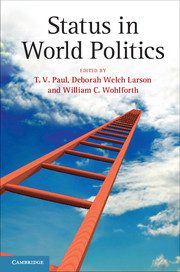Book contents
- Frontmatter
- Contents
- Figures
- Tables
- Contributors
- Acknowledgments
- Part I Introduction
- Part II Admission into the Great-Power Club
- Part III Status Signaling
- Part IV International Institutions and Status
- Part V Status, Authority, and Structure
- Part VI Conclusions
- 11 Why Status Matters in World Politics
- Index
- References
11 - Why Status Matters in World Politics
Published online by Cambridge University Press: 05 June 2014
- Frontmatter
- Contents
- Figures
- Tables
- Contributors
- Acknowledgments
- Part I Introduction
- Part II Admission into the Great-Power Club
- Part III Status Signaling
- Part IV International Institutions and Status
- Part V Status, Authority, and Structure
- Part VI Conclusions
- 11 Why Status Matters in World Politics
- Index
- References
Summary
The Stakes
According to traditional theories of world politics, peaceful power transitions only happen when the rising power continues to profit from the institutional order held together by the material capabilities of the declining power. Peace today depends on whether states such as China can remain satisfied as they rise within the existing hierarchy of power and authority. Traditionalists, including some in this volume, reject an independent role for status in major power conflict for structural and rationalistic reasons, based on either material power or legitimate material power. So why bother studying international status? This chapter considers these arguments, and in so doing draws in and amplifies the contributions this volume makes in explaining why status matters in world politics and what further needs to be done to understand its role.
A state’s status is fundamentally different from its material position in the international system, because status is a product of social construction. The editors of this volume define status as “collective beliefs about a given state’s ranking on valued attributes (wealth, coercive capabilities, culture, demographic position, socio-political organization, diplomatic clout).... Status is collective, subjective, and relative” (Chapter 1, pp. 7–8). The material positionality so central to structural theories, such as those of William Thompson (Chapter 9) and David Lake (Chapter 10), is insufficient to explain the import of status or the politics surrounding it. For explanations, we must include other approaches that focus on how the self adopts identities that entail particular statuses, and those that emphasize the social institutions that shape the legitimacy and appropriateness of status claims. As the editors stress, status cannot be objectively inferred from the distribution of material capabilities in the system. Status is not fixed; it is a contingent and dynamic concept dependent on perceptual judgments of the self and others, social institutions, and the interaction of actors over time.
- Type
- Chapter
- Information
- Status in World Politics , pp. 273 - 296Publisher: Cambridge University PressPrint publication year: 2014
References
- 20
- Cited by



